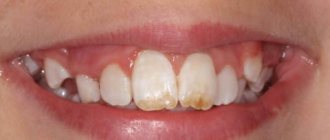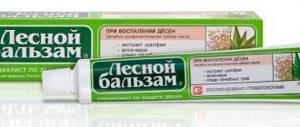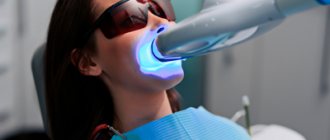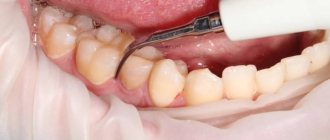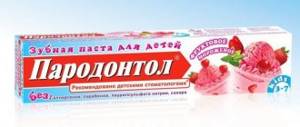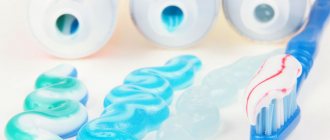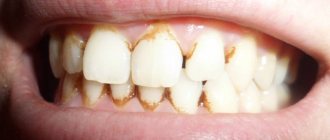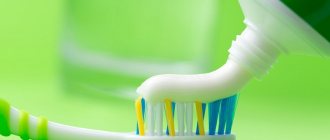Everyone has long been accustomed to seeing fluoride in the composition indicated on the label of most toothpastes. There is nothing strange about this, since this substance, which prevents the occurrence and development of caries, has been used in the production of this product for cleaning teeth for more than a century. True, fluorine is not taken in its pure form, but its various compounds (sodium, tin and aluminum fluorides). When the paste enters the mouth, where it mixes with saliva, these compounds break down into ions, the wonderful properties of which are praised in numerous commercials.
The history of fluoride in toothpastes
Fluoride was first used in toothpastes more than 100 years ago, in 1914 in the USA. At the beginning of the 20th century, scientists found that this element is an excellent protection against caries and its use reduces the rate of tooth decay by an average of 30-45%. Under the influence of fluorine, enamel became resistant to acids and more durable.
Why is fluoride needed in toothpaste?
Surprisingly, the same element can be both healing and destructive to the body. And fluoride is just that: the substance can both restore and strengthen tooth enamel, and cause irreparable harm to it. It is thanks to fluoride that the strength of bone tissue in the body is maintained; this element plays a key role for the health of hair, nails and teeth. Fluoride is very important in the growth and development of a child: without it, his skeleton does not develop normally.
In addition, fluorine has a beneficial effect on metabolism: without this element, the body cannot remove heavy metals. The substance also helps absorb iron and supports immunity.
When there is a lack of fluoride in the body, bones and teeth are the first to suffer. Bones bend, become brittle and brittle, and in the event of a fracture they heal very slowly. With a lack of fluoride, the enamel gradually becomes thinner, it is increasingly affected by plaque bacteria, and caries develops faster and faster.
In fact, it is not difficult to provide the body with its daily requirement of fluoride. Products high in this substance include:
- a variety of fruits, such as grapefruits and apples;
- nuts;
- dairy products;
- various types of meat (especially liver);
- various vegetables - pumpkin, spinach, potatoes;
- buckwheat and oatmeal porridge;
- honey;
- any types of tea.
By drinking enough water per day and eating right, you can provide yourself with fluoride. Therefore, the need for toothpastes with fluoride should only be determined by a dentist. As a rule, fluoride products are prescribed to smokers and people who abuse coffee.
Relevance of the issue
The human body cannot fully exist and function normally if there is no source of fluoride, for example, sodium monofluorophosphate. Chemists and doctors, especially dentists, know well what this compound is. Fluorine is an extremely important trace element for the human body, which is usually present in the form of compounds. The main percentage of flora accumulates in dentin, covering the dentition, enamel, and bone tissue. About 0.03 mg per day per kilogram of weight for an adult must be obtained from external sources. For a child, indicators vary between 0.15-0.1 mg/kg.
In medicine, the substance is classified as an inhibitor of bone resorption and a caries preventive agent. If necessary, sodium monofluorophosphate is indicated to replenish fluoride deficiency. Chemists can explain what it is: the substance is a powder formed by colorless crystals. To dissolve, you need to take 25 times more water than the compound is available.
Pros of fluoride toothpastes
Many people specifically choose hygiene products with fluoride to strengthen their teeth and prevent the development of caries. Indeed, in some cases, this element protects the enamel from the action of harmful bacteria and strengthens it. Under the influence of fluoride, less acid is released, which affects the enamel. Therefore, anti-caries toothpastes often contain fluoride.
The main benefits of fluoride toothpastes include:
- antiseptic effect;
- improvement of metabolism;
- improvement of the remineralizing effect of saliva;
- stimulation of the salivary gland;
- inhibition of the transformation of soft plaque into tartar.
Harm of toothpastes with fluoride
Unfortunately, many of us forget that toothpaste is not the only source of fluoride. This element is found in many foods and even in ordinary tap water.
Before you buy even the best toothpaste with fluoride, it is important to understand your need for this element: its daily intake should not exceed three milligrams. In order to get this dose, it is enough to drink two liters of water a day.
For a person who eats right and drinks enough water, it is not at all necessary, and often even harmful, to use toothpastes with fluoride. The fact is that this element in excess amounts is toxic to the body. The substance accumulates in tissues, including tooth enamel. If too much fluoride accumulates in it, fluorosis appears, the process of destruction of enamel.
Fluorosis is very easy to recognize. The disease manifests itself as white spots on the surfaces of the teeth. These spots grow quickly, turn yellow and begin to corrode the enamel. In case of fluorosis, it is important to start treatment as soon as possible - remineralizing therapy, photophoresis or the use of special applications.
Often, teeth with fluorosis require additional whitening, because it is almost impossible to cope with such a problem with the help of professional cleaning.
European Fluoride Directive –
The European Academy of Pediatric Dentistry (EAPD) recommends the prophylactic use of fluoride toothpaste for everyone, including pregnant women, as a primary preventative measure against dental caries. The most effective way to prevent dental caries is to brush your teeth twice a day, which should be achieved not only by using toothpaste and a brush, but also by flossing.
Parents should start brushing their children's teeth with fluoride toothpaste as soon as the first tooth emerges. For this, the concentrations recommended by the European Academy of Pediatric Dentistry (EAPD), indicated in Table 1, should be used. Thus, in children from 6 months to 2 years, the fluoride concentration in the paste should be 500 ppm, in children 2-6 years old – 1000 ppm , over 6 years old and adults – 1450 ppm.
Recommendations also include - 1) After brushing their teeth, children should spit out the toothpaste and not rinse their mouth with water afterwards. 2) Parents should use the recommended amount of toothpaste and concentration of fluoride, and assist or supervise their children with brushing their teeth until at least 7 years of age. All of the above EAPD recommendations apply subject to normal levels of fluoride in drinking water (source).
Indications for the use of fluoride pastes
Of course, in some cases, toothpastes with fluoride will be useful to patients, but, as we have already said, only a dentist should prescribe them. The specialist will assess the condition of the enamel and oral cavity, and then determine whether the teeth have enough fluoride and what kind of toothpaste they need.
Therapeutic toothpastes with calcium and fluoride are indicated for use if the patient has:
- signs of dental demineralization;
- poor enamel resistance to acids;
- fragility of teeth, tendency to chip;
- minor signs of caries.
The fluorides contained in such toothpastes create a thin protective layer on the crowns. All substances hazardous to enamel do not penetrate it and their negative impact is reduced several times. Incoming fluoride, when it is deficient in the body, slows down the proliferation of bacteria and, accordingly, the development of caries. The likelihood of gum inflammation is also reduced.
It is forbidden!
Sodium monofluorophosphate will become a source of harm if it is used by a child under six months of age. For systemic use, fluorides are prohibited if a person has kidney or liver diseases and dysfunction of these systems. You should not take fluoride in food if a peptic ulcer localized in the intestines or stomach has worsened. The period of childbearing and lactation also becomes a limitation. Fluoride should be used with caution in children under fourteen years of age.
Consequences of excess fluoride in the body
Do not forget that fluorine is, first of all, a toxic substance. It is added to toothpastes only in the form of compounds that can release active ions. The pastes contain sodium fluoride, sodium monophosphate, as well as tin and aluminum fluorides, and amino fluoride.
When fluoride enters the body of an adult in excess quantities, the following problems may begin:
- disruption of metabolic processes and, as a result, destruction of bones and teeth;
- disruptions in the functioning of the endocrine system;
- liver and kidney diseases;
- increased blood pressure;
- decreased immunity.
Surprisingly, translated from Greek, the word fluorine means “destroying.” Fluorine compounds in the gaseous state are deadly. And fluorites, often added to toothpastes, are considered one of the most harmful substances for the body.
If you use fluoride paste constantly, without apparent need, the following changes may occur in the oral cavity:
- damage to the enamel, the appearance of stains on it;
- fragility of teeth;
- increased sensitivity of teeth.
When is it used?
It is common to use fluoride, which produces sodium monofluorophosphate, as an element of a therapeutic course for osteoporosis. The substance is recommended both for people suffering from the steroid type and for those for whom the risks of such a pathology are assessed above average. Fluoride compounds can be taken by patients with primary osteoporosis of various natures, including the idiopathic form, in which the etiology of the case cannot be established. Fluoride compounds are prescribed to prevent caries in people of any age, as well as as part of a therapeutic course for local osteopathy. Fluoride supplements are recommended if the water a person drinks contains less than 0.6 mg/ml fluoride.
Children's toothpastes with fluoride
Children's toothpastes should absolutely not contain fluoride, despite the fact that this element is necessary for growing organisms. Fluoride is added only to toothpastes for children and adolescents over 5 years of age. The thing is that young organisms perceive various components much more strongly and are many times more susceptible to fluorosis (excess fluoride).
So, now you know the benefits and harms of fluoride in toothpastes. You should not decide on the use of such means on your own. Only an experienced dentist should prescribe pastes with fluoride and calcium.
To avoid the need for medicinal pastes, take good care of your teeth and be attentive to your body. Do not get carried away with coloring products, coffee, tea and sweets. For dental health, the absence of bad habits, proper, balanced nutrition and daily thorough hygiene procedures are important.
An excellent tooth support product is ASEPTA “Remineralization” professional toothpaste with high concentrations of hydroxyapatite and thermal mud. This remedy restores tooth enamel, reduces the sensitivity of teeth and gums and accelerates the regeneration of the oral mucosa.
Clinical researches
Clinical studies have proven that regular use of professional toothpaste ASEPTA REMINERALIZATION improved the condition of the enamel by 64% and reduced tooth sensitivity by 66% after just 4 weeks.
Sources:
- Report on the determination/confirmation of the preventive properties of personal oral hygiene products “ASEPTA PLUS” Remineralization doctor-researcher A.A. Leontyev, head Department of Preventive Dentistry, Doctor of Medical Sciences, Professor S.B. Ulitovsky First St. Petersburg State Medical University named after. acad. I.P. Pavlova, Department of Preventive Dentistry
- Study of the clinical effectiveness of treatment and prophylactic agents of the Asepta line in the treatment of inflammatory periodontal diseases (A.I. Grudyanov, I.Yu. Aleksandrovskaya, V.Yu. Korzunina) A.I. GRUDYANOV, Doctor of Medical Sciences, Prof., Head of Department I.Yu. ALEXANDROVSKAYA, Ph.D. V.Yu. KORZUNINA, asp. Department of Periodontology, Central Research Institute of Dentistry and Maxillofacial Surgery, Rosmedtekhnologii, Moscow
- Clinical studies of antisensitive toothpaste “Asepta Sensitive” (A.A. Leontyev, O.V. Kalinina, S.B. Ulitovsky) A.A. LEONTIEV, dentist O.V. KALININA, dentist S.B. ULITOVSKY, Doctor of Medical Sciences, Prof. Department of Therapeutic Dentistry, St. Petersburg State Medical University named after. acad. I.P. Pavlova
